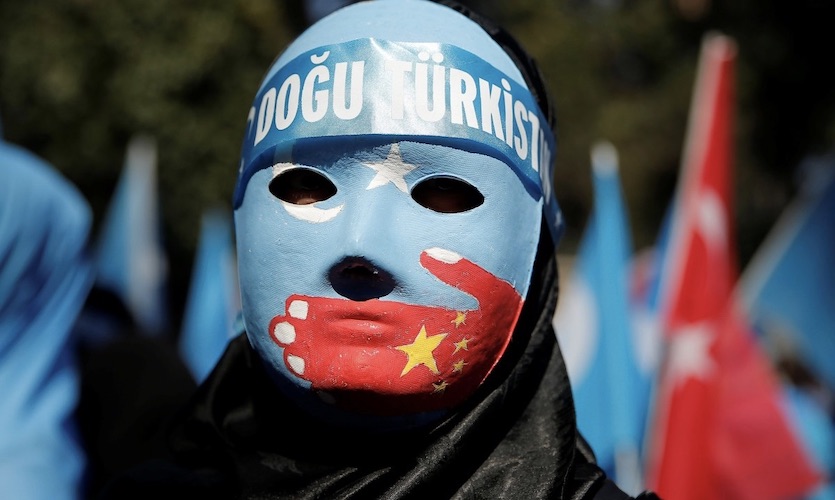Amid reports of serious human rights violations against Uyghur Muslims in China’s Xinjiang province, a new report has accused Chinese authorities of imposing forced interethnic marriages on Uyghur Muslim women. The report claims that since 2014, the Chinese government has been systematically imposing forced interethnic marriages between Uyghur women and men from the Han community, one of the oldest ethnic groups in China, in East Turkistan.
The report titled ‘Forced Marriage of Uyghur Women: State Policies for Interethnic Marriages in East Turkistan’ states that the Chinese government is actively involved in carrying out this campaign and playing a huge role in promoting interethnic contact between Uyghur women and Han people. The report by the Washington-based Uyghur Human Rights Project (UHRP) has been published supposedly after examining evidence from policy documents, government-sanctioned profiles and testimonials, accounts from women in the Uyghur diaspora, and Chinese media reports.
Forced Marriage Under Xi’s “New Era”
According to the report, forced marriage between Uyghur women and Han men is part of President Xi Jinping’s “new era”, implemented in 2014, to strengthen interethnic contact, exchange, and mingling.
The report claims that the government has been systematically promoting interethnic marriages specifically in the Tibet Autonomous Region (TAR) and the Xinjiang Uyghur Autonomous Region (XUAR).
In order to promote the “ethnic unity” in China, the Communist Party of China created the “Ethnic Intermarriage Family Forum” in June 2014, to encourage the intermarriage between the Chinese and 19 other ethnic groups, including the Tibetan, Han, Miao, Mongolian, and Hui.
The Party-State (Chinese government) urged government authorities at all levels to play a positive role in promoting perfect “matchmakers”, and be the bridge to connect “soulmates” between two different ethnic groups.
In order to make this campaign successful, the report further added that the policy is providing tangible support and incentives, including schooling, employment, joining the CPC, joining the army, entrepreneurship support, and appraisals of excellence, to all the ethnic groups.
Scholar and researcher James Leibold said that more interethnic marriages would mean more ethnic unity, greater stability, and a more secure environment for Xi Jinping’s defining foreign policy – the Belt and Road Initiative (BRI).
Incentives For Interethnic Marriage
In Xinjiang’s Qiemo county, the local government is providing 10,000 yuan (US $1,600) every year, for at least five years, to newly married couples. Apart from the financial help, other incentives include help with housing, medical care, government jobs, and tuition waivers through high school for children conceived by such marriages.
Propaganda Media Promotion
The mouthpiece of the Chinese government is promoting interethnic marriages through the propagandist wedding videos and photos on its website and social media. The report said that a video has been released, featuring a Uyghur woman and Han man who can be seen thanking the Chinese government and describing a “beautiful life” given by local authorities.
On the other hand, another video shows the Uyghur women appear distressed during the wedding ceremonies, prompting viewers’ concerns that the marriages are forced or coerced. The report cites Uyghur Muslims who left China due to the government’s harassment, and informs how they dismissed the Chinese media’s wedding evidence, and called them all forced marriages under strict policies of the government.
Rise In Interethnic Marriages
Scholar Darren Byler, who reviewed the document on Uyghur-Han marriage in China, claims that frequency of marriage between Uyghur women and Han men has risen substantially since 2018.
Some evidence suggests that marriage incentives seem aimed at encouraging Han men to move to the region to marry Uyghur women.
The UHRP further mentions that forced and incentivised marriages in the Uyghur region are forms of gender-based crimes that violate international human rights standards. Government policies incentivising and coercing interethnic marriage and other gender based-abuse only further the ongoing genocide and crimes against humanity being committed in East Turkistan.
Destroying Uyghur culture
The report claims that forced marriage of Uyghur women in the Xinjiang province has been intensified since 2018. The government has been working on Xi’s main agenda “one nation race” and thus, interethnic marriage is one of the most vigorous tactics of the Chinese government to root out the culture of the Uyghur people and consequently, the community. The report states that this is another tool of genocide and crimes against Uyghur Muslims.
Spying on Uyghur Muslims
In the name of security concerns, the Chinese government has been keeping an eye on every single activity of Uyghur Muslims over a long time. Last week, a report claimed that several Uyghur language apps were attacked by Chinese spyware. Reportedly, US-based Cybersecurity researchers found evidence that two strains of spyware linked to Chinese state-backed hacker groups infiltrated several multiple Uyghur-language Android apps.
The report claims that Chinese hackers are attacking dictionaries, religious apps, maps, and even pirated versions of WhatsApp available on third-party stores or shared on Uyghur-language channels on Telegram. The spyware enables hackers to collect sensitive data including a user’s location, contacts, call logs, text messages and files, as per the report, and could also take photos and record calls.
Meanwhile, on November 14, the exiled Uyghur Muslim people celebrated the formation of the two East Turkistan republics in Turkey. The meeting attended by over 2,000 delegates, including NGO representatives and community members, vowed independence from the People’s Republic of China.
Read more: 50 Million People Are Facing ‘Modern Slavery’ Worldwide, Says UN










